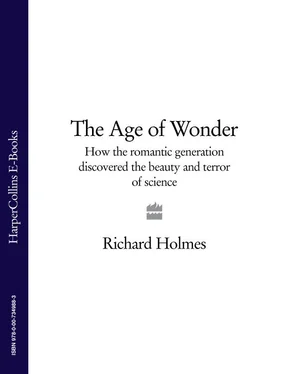At fourteen William joined the Hanover regimental band, alongside Jacob and his father. He soon learned to turn his hand to an astonishing array of instruments-the oboe, the violin, the harpsichord, the guitar and, a little later, the organ. He was also starting to compose, and had an early fascination with musical notation and the theory of harmony. Both he and Jacob appeared as young solo performers at the court of the Elector of Hanover, and their names were not forgotten. ♣
Caroline also remembered long philosophical arguments at home in the evenings, when the brothers returned after concerts. She would lie awake in her bedroom, trying not to fall asleep and secretly delighting in William’s quiet, calm voice steadily contradicting Jacob’s furious outbursts. According to her the names of ‘Leibniz and Newton’ were shouted from the parlour ‘with such warmth that my Mother’s interference became necessary’. 21 When their father was at home these conversations on philosophical subjects became even more rowdy, and would frequently last till dawn. The combination of Leibniz and Newton suggests that William and Jacob were arguing about the rival virtues of calculus (a mathematical system invented by Leibniz) and fluxions (a similar system invented-but jealously guarded-by Newton). Both systems produced the new mathematics of curves and gradients, essential to the astronomical calculation of planetary orbits and the elongated ellipses of comets. It was an unusual household. 22
In November 1755 the five-year-old Caroline witnessed a strange portent of disruption in the after-shock of the Lisbon earthquake, which amazingly travelled as far as Germany. As she remembered it, the whole barracks shook. ‘I saw both my parents standing aghast and speechless…my brothers came running in…all [the family] being panic-struck by the earth quake.’ 23 This earthquake, which killed over 30,000 people in Lisbon and shook cities throughout Europe, seemed to many to call into question the idea of God (or Nature) as a benevolent Providence, and to be a sign that a new kind of scientific knowledge was required. Among many speculative works, it inspired Voltaire’s Candide. Caroline always retained a superstitious horror of earthquakes, and said she felt one years later when she stood by her father’s deathbed. 24
In the spring of 1756, when William was seventeen and Caroline was six, the Hanover Foot Guards were posted to England, to serve under their ally the Hanoverian King George II. It was the outbreak of a long, desultory and financially draining conflict with the French that would become the Seven Years War, and would radically affect the fortunes of the Herschel family. Jacob tried to obtain a home posting with the court orchestra, but failed, and all the men of the family were conscripted. Caroline remembered the grim, silent bustle in the house. ‘My dear father was thin and pale, and my brother William almost equally so, for he was of a delicate constitution and just then growing very fast. Of my brother Jacob I only remember his [making] difficulties at everything that was done for him.’ The rest of the family, the three younger children including the baby Dietrich, were abruptly left on their own as the men departed.
Caroline’s sense of this human drama is well caught in her Memoir. ‘The troops hallooed and roared in the streets, the drums beat louder…and in a moment they were all gone. I found myself now with my Mother alone in a room all in confusion, in one corner of which my little brother Dietrich lay in his cradle; my tears flowed like my Mother’s but neither of us could speak.’ Then Caroline made a touching gesture towards the mother she feared. She ran and found one of her father’s large cambric handkerchiefs, unfolded it, and carefully placed one corner in her weeping mother’s hand, while holding onto the opposite corner herself. They were united, at least, in grief. ‘This little action actually grew a momentary smile into her face.’ 25
The Hanover Regiment were stationed at Maidstone, in Kent. Jacob spent his pay on fashionable English clothes, William on English books, and Isaac on an allowance for Anna and the children. William fell in love with the country, began to learn the language, and made a small circle of English friends. For the first time there are hints that he was secretly beginning to dream of an entirely different, freer kind of life in the land of Newton, which had been adopted by his fellow German Handel. When the Hanover Guards were posted back to Germany the following spring to fight the invading French armies, Jacob packed a beautifully tailored English suit, and William a copy of John Locke’s Essay Concerning Human Understanding. 26
Caroline remembered their return, one freezing winter evening in December 1756. 27 Her mother Anna was preparing a welcome-home dinner, and the six-year-old Caroline was sent to collect her father and brothers from the parade ground. But she missed them in the dark and confusion, and the frightened little girl had to make her own way home. ‘I continued my search till I was spent with cold and fatigue, and on coming home I found them all at table, nobody greeting me but my brother.’ As she remembered it, no one had even noticed her absence except William. She never forgot his reaction. ‘My dear brother William threw down his knife and fork, and ran to welcome and crouched down to me, which made me forget all my grievances.’ 28
Jacob now obtained a timely discharge, but William and his father took part in the disastrous battle of Hastenbeck, which was fought against the French invaders twenty-five miles outside the city of Hanover, on 26 July 1757. The surrounding countryside was overrun by a French army of 60,000 troops under Marshal d’Estrées. The allied general, the Duke of Cumberland, beat a strategic retreat westwards towards Flanders. Hanover was occupied, and the Herschels’ building had sixteen French infantrymen billeted on it. 29
After a hasty family conference it was decided to smuggle William-still only eighteen-out of Germany altogether. Caroline recalled a fleeting, romantic glimpse of her brother’s surreptitious departure as she stood anxiously by the street door, told not to call out or give him away: ‘he glided like a shadow along, wrapped in a great coat, followed by my mother with a parcel containing his accoutrements ’. 30 William slipped past the last sentinel at Herrenhausen, and made his way to Hamburg, where he took ship again for England. At the last moment he was joined by Jacob, and together the two brothers arrived, penniless refugees, in London. They supported themselves by copying musical scores, giving oboe lessons, and playing as freelance musicians in local orchestras. They gave a successful concert in Tunbridge Wells. In the evenings William read voraciously: English novels, books on mathematics and musical harmony, Robert Smith’s Harmonics (1749) and James Ferguson’s recently published and immensely popular Astronomy Explained (1756). 31
By the autumn of 1759 Jacob was finding the life too hard, and slipped back to Hanover with his and William’s combined savings, eventually finding employment as a court musician. 32 Now, for the first time in his life, William Herschel, aged twenty-one, was alone-but free, talented, and in the country of his choice. And with a secret gift, his genius for astronomy, hidden even from himself-but awaiting the opportunity to unfold. For the next five years he virtually disappeared from the family history.
Caroline was devastated when William went abroad. In retrospect, she realised that it was he alone who had cared for her, and in his long absence he became a sort of legendary figure. At home her misery deepened. Hanover remained occupied, and food supplies were short. She continued going to the garrison school, but was not allowed to learn arithmetic or languages, and was increasingly treated as a maidservant by the family. She remembered sewing immensely long woollen stockings, scrubbing laundry, and writing her mother’s letters to her father on campaign. In fact her unusual literary ability was a rare source of pride, as she later recalled. ‘My pen was taken frequently in requisition for writing not only my Mother’s letters to my Father, but to many a poor soldier’s Wife in our Neighbourhood to her Husband in the Camp; for it ought to be remembered that in the beginning of the last century very few women left country schools with having been taught to write.’ 33
Читать дальше












